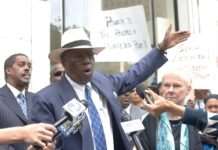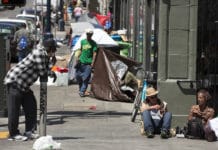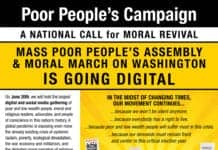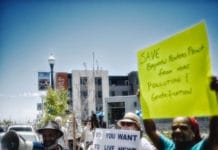We must speak up, unite around our common values and demand more from government than a balanced budget
by NTanya Lee, Coleman Advocates for Children and Youth
 Despite the jokes about San Francisco seceding from the nation for our “only in San Francisco” ways, we are in fact not in a bubble. Our people and our livelihoods are deeply connected to the global economy, which is in a protracted crisis and may get worse.
Despite the jokes about San Francisco seceding from the nation for our “only in San Francisco” ways, we are in fact not in a bubble. Our people and our livelihoods are deeply connected to the global economy, which is in a protracted crisis and may get worse.
Despite the city’s considerable wealth, our local economy is suffering. Ten thousand more San Franciscans are unemployed than a year ago, 1,000 families have lost their homes to foreclosure and more people are waiting in lines for free food than anyone has seen in a generation.
This of course is the context for our local budget crisis – one shared by local governments across the nation. City government’s unique role is to collect the people’s money and spend it on the people’s needs. Public dollars, decided by public decisions, for the public good.
In such devastating times, the city’s residents have a lot less to spend in our economy and have less assets to tax, and so the city’s revenue declines by tens of millions of dollars. Yet city government still has the responsibility to meet the city’s needs: a hospital to run, police officers to pay, youth centers to keep open. The result: a $570 million projected deficit.
We’ve made it through budget deficits and budget crises before – Coleman Advocates has been involved in every budget crisis for almost 30 years – but this one is different. The scale of this crisis requires rethinking old ways of doing business, putting aside politics as usual and sharing the pain.
It also requires from each of us the public policy equivalent of a moral compass – an internal clarity about our core values and the courage to stand up for them. What values do we as San Franciscans truly cherish?
San Francisco values
With an economy in severe crisis and a $570 million deficit, is a time to get clear, San Francisco. What is our “moral compass”? Where are we united? Here’s a place to start.
1. We are a city of hope and change. We believe in the constant and enduring push towards greater justice and equality for all people.
2. We believe that we are stronger with collective effort and collective responsibility. No one becomes economically secure, gets healthy or stays safe through their individual efforts alone. San Franciscans need each other and we must each make an equitable contribution, based on our own ability.
3. We believe in protecting and honoring our community’s most vulnerable members – our children, our elders, the sick and frail.
4. We believe in democracy – in real civic participation of everyday people, and in making sure that the privileged few don’t have more political power than the rest of us.
5. We believe that government can be an instrument of change, to improve our health, to regulate our economy, to provide paths of opportunity for our children, eliminate poverty and even save the planet.
A values-based approach to solving the city budget crisis
United by these values, we call on Mayor Newsom and the Board of Supervisors to use this framework for solving the local budget crisis:
 1. Protect the most vulnerable San Franciscans, and especially our children. In tough times, parents will eat less and still feed the kids because they know their children are still growing. Parents will cut out every single perk for themselves before they let their children suffer. We expect the same from our elected leaders – they must protect children as an especially valuable but vulnerable population, and put political ambition aside to fight like hell for the kids.
1. Protect the most vulnerable San Franciscans, and especially our children. In tough times, parents will eat less and still feed the kids because they know their children are still growing. Parents will cut out every single perk for themselves before they let their children suffer. We expect the same from our elected leaders – they must protect children as an especially valuable but vulnerable population, and put political ambition aside to fight like hell for the kids.
a. Preserve the safety net set-asides for kids and other vulnerable groups – including the Children’s Amendment/Children’s Fund, and Prop H, the Public School Enrichment Fund. There must be no raids on their funding or legislative efforts that erode or eliminate these safety nets.
2. Share the pain and make cuts based on policy and values-driven guidelines. Our values should drive our priorities, and we do believe that everyone will have to do their part. As indicated above, we understand that even if children were the city’s highest priority, the scale of crises means that some cuts will be necessary. Cuts to children’s services should be guided by principles in collaboration with community and labor partners, including the following (which have not been finalized by the Family Budget Coalition).
a. Protect services and supports to the most vulnerable of our children, young people and families – poor children, children at high risk of violent injury, families at the edge of homelessness or disruption, and children who are the responsibility of public systems, which includes child welfare/foster care and the juvenile justice system.
b. Minimize cuts to services that leverage other dollars.
c. Identify opportunities for service collaboration and streamlining.
d. Minimize cuts to direct services – cut administration, evaluation, planning and monitoring before services.
e. Minimize cuts that have multiple ripple effects on systems of care and support; for example, child care subsidies have an impact on a parent’s ability to work, on family incomes, child safety, stability of child care center funding etc.
f. Prioritize community-based recovery, rehabilitation and support over more expensive institutionalization and incarceration.
3. Create new opportunities for real democratic debate and participation. Everyone knows the “public” part of the budget process is a farce. Advocates are forced to mobilize to protect their constituencies to “fight cuts” at long hearings with often little impact, while the truly powerful interests make back room deals with the decision-makers. (Have you ever seen GAP CEO Don Fisher at a budget hearing?) Yet workers, community based contractors and everyday San Franciscans know about trade-offs and hard choices – we just aren’t given the opportunity to actually discuss them together. Similarly, it is clear that when stakeholders are invited in an honest way to participate in department decisions about budget cuts – not just told what the cuts will be – they have been more inclined to accept those decisions, even when they are financially painful. We suggest Budget Townhalls structured to allow for debate and dialogue between residents and city officials, and among residents themselves.
4. Chop at the top – those with the most should shoulder the greatest burden. This is a basic principle of equity. The city’s highest paid managers and workers must take pay cuts, through labor negotiations. If city workers are to make any concessions around wages or other issues, this equity principle should be applied.
5. Raise tax revenue at the ballot to protect the safety net for vulnerable San Franciscans. The city’s wealthiest individuals and businesses must step up to the plate and share the responsibility for the vital work of local government. Times might be tough, but no one in the city’s financial sector is going hungry any time soon. If a real campaign can be built in time for the June election, we support moving forward with progressive revenue measures that are targeted to safety net services.
6. Eliminate all remaining inefficiencies and waste – especially if protected by voter mandates. Implement recommendations of the city’s own Budget Analyst and Controllers’ Office audits regarding cost-savings in the Fire Department, Police Department and other parts of city government. Take legislative or budget action to cut waste from the $185 million fire department set-aside to allow for at least $20 million in cost savings to be reallocated to services to vulnerable San Franciscans.
7. Hold hearings on structural reform of the budget process. There is a consensus that the budget process is deeply flawed, disconnected from our values, policy decisions and, often, from just plain common sense. We are members of the Community Budget Reform Council, which will soon be distributing recommendations about changes to the entire process, including the timeline, the roles of the executive and legislative branches, a new role for the Budget Analyst, coordination with labor negotiations and political negotiations about revenue measures, and increased transparency and effective democratic participation.
Where we stand on ‘set-aside reform’
This week Supervisors Ross Mirkarimi and David Chiu introduced a proposal to gut all set-asides, including the Children’s Amendment, to go before voters in a special June election. The Charter Amendment includes a proposal to cap all set-asides at their FY08-09 levels, to authorize a 25 percent cut in set-aside funding when the projected deficit is over $100 million, and allow the Supervisors to raid 100 percent of any set-aside during a city “emergency.”
As discussed, we do need real structural reform to solve our city’s budget crisis, but this isn’t it. Under the guise of good government, this proposal as it stands is an attack on our kids. Shredding the city’s safety net for children means throwing thousands of kids into the streets and into the line of fire. It’s irresponsible and fails the test of our moral compass.
We do support reform of set-asides and voter mandates but do not support a “one size fits all” approach to reforming budget set-asides or voter mandates. Most set-asides do not protect vulnerable populations, while the Children’s Amendment and Prop H, the Public School Enrichment Fund, do.
Shredding the city’s safety net for children means throwing thousands of kids into the streets and into the line of fire.
The different kinds of voter mandates can be improved in distinct ways, to better meet city policy goals, protect vulnerable populations, address issues of unequal political power in the budget process and provide some flexibility to city decision-makers in times of true fiscal emergency in order to save services that do not have mandated protections. With some reform, the city could possibly reallocate $30-$50 million for critical safety net services that are not protected by set-asides or mandates.
For example, there are a number of unique problems with voter-mandated minimum staffing in the Fire Department and Police Department: The staffing minimums are supposed to protect public safety but are not tied to any public safety outcomes like reducing crime or improved response times. Mandating exact numbers of staff is an inappropriate way around labor union negotiations that every other public sector union must engage in.
And finally, the Fire Department mandate is especially inflexible and inefficient because it mandates site-specific staffing and equipment, despite city reports that this 19th-century style of deployment costs millions for the city with no added public safety benefit. We believe the Fire Department expenditure mandate can be changed without a charter amendment.
Finally, we also view the city’s MOUs with labor unions as time-limited set-asides, as they add up to hundreds of millions of dollars in the non-discretionary part of the budget that elected leaders cannot legally touch each year. We unequivocally support the right of labor to negotiate a living wage and good working conditions for their members. One reform that could improve budget planning would be to better time negotiations with the city budget decision-making timeline and to have more transparency about the budget impact of the Mayor’s Office negotiations with labor before they are finalized in haste at the Board of Supervisors.
More than a balanced budget at stake
If we fail to live up to our values, San Francisco’s safety net will collapse and precipitate a catastrophe in our city the likes of which no one has seen since the Great Depression. The mayor’s budget plan includes almost $300 million in cuts, with no real plan to minimize the human suffering.
Over the next years, as more families lose their jobs, their homes and their tenuous access to safety net supports from local and state government, we will see more families on the street, more children in our jails, and more despair and violence in our most desperate and dis-invested neighborhoods. There are tough choices ahead, but with true community participation and with a united voice around our values guiding these choices, we will survive this crisis with the least harm to the most vulnerable among us.
This is a statement of Coleman Advocates for Children and Youth, and does not represent the opinions of all the members of the Family Budget Coalition. For more information, contact NTanya Lee, executive director, or Chelsea Boilard at Coleman, at (415) 239-0161.

 Store
Store












